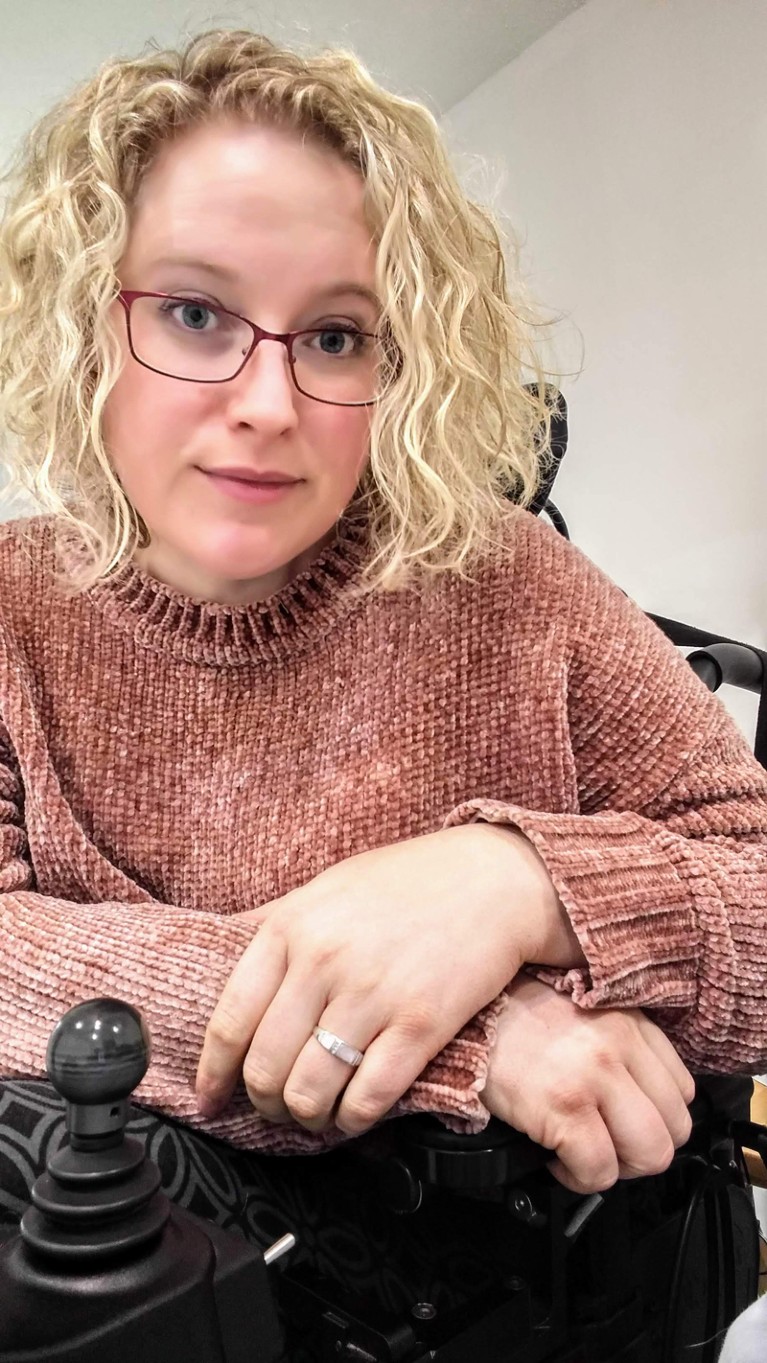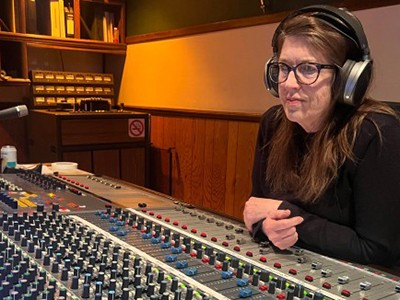In 2019, Jenna Keindel came across a research paper that would change her life. The Canadian, then aged 37, found it through a Facebook group of people affected by limb-girdle muscular dystrophy (LGMD), a condition that causes progressive muscle weakness. Keindel was diagnosed with it when she was 16.
The paper suggested that another condition, called anti-HMGCR myopathy, a rare autoimmune disease that causes severe muscle weakness, shared some symptoms with specific subtypes of LGMD and was sometimes misdiagnosed as LGMD.
Keindel was struck by the similarity with her own symptoms. And because the paper was open access, and so free to view, she could read and digest the findings before sharing them with her clinical team at the Ottawa Hospital. They agreed it was worth testing her for the condition.
“Doctors and specialists can’t possibly read every article that’s being published,” she says. “So, as a patient with a rare disease, you kind of have to also be a catalyst and a helper for finding those resources.”
Six weeks later, her physician confirmed that Keindel did, in fact, have anti-HMGCR myopathy, not LGMD. Since receiving treatment to fit the new diagnosis, Keindel’s muscle deterioration has slowed considerably. She married in 2023 and now lives and works in Shawville, a small rural community in the northwest of Canada.
Kelly Cobey, who directs the Metaresearch and Open Science Program at the University of Ottawa Heart Institute, celebrates Keindel’s story as evidence of the benefits of making research data accessible to everyone. Cobey’s work focuses on implementing open-science practices, promoting responsible research assessment and monitoring the quality of research reporting.

Jenna Keindel’s clinical experiences demonstrated to Cobey the life-changing benefits of sharing research with people receiving care.Credit: Jenna Keindel
Last year, Cobey’s work in this area, and her focus on advancing awareness of predatory journals, earned her the John Maddox Prize in the early-career category.
A joint initiative between Nature and Sense about Science, a London-based charity, the award celebrates scientists who speak up for sound science in the face of challenges, and who inspire others to do the same.
“We just cannot underestimate how empowering people with information can literally change the course of their life,” says Cobey of Keindel’s story. “Patients need to be active in decision-making and how they’re cared for.”
Cobey had first heard Keindel’s story in 2019, when she worked as an investigator and publications officer at the Ottawa Hospital’s Centre for Journalology. There, she spent half her time researching open science, research integrity, transparent research reporting and predatory journals, and the other half providing training and outreach on these topics.
The leader of the hospital’s patient–partner network, a link person between individuals interested in taking part in research and researchers looking to engage such people, suggested that Keindel’s story would be a good fit for a series of webinars and blogs that Cobey was developing. The aim of these was to demonstrate the benefits, some of them life-changing, of making information available to people receiving care.
Cobey dates her interest in open science and research assessment back to 2011, when she was studying for her PhD in social psychology at the University of Groningen in the Netherlands. That year Diederik Stapel, an acclaimed social psychologist at nearby Tilburg University, was suspended on suspicion of widespread data fabrication. In November of the following year, a report concluded that he had fabricated and manipulated data across 55 publications over 15 years, including in chapters of his PhD dissertation at the University of Amsterdam in 1997. “When this happened, some of my early-career colleagues, postdocs or assistant professors retracted major chunks of their CVs as a consequence,” Cobey recalls.
The experience made her question how something like this could persist for so long. “I’m not saying open science will get at every sort of bad actor, but it was like, how was there no record, how was there no openness?”
Working Scientist career profiles
Cobey decided to look for roles that would allow her to question how research is carried out, incentivized and rewarded. When, in 2015, she came across the role of investigator and publications officer at the journalology centre in Ottawa, she had never heard of meta-research, the practice of applying rigorous methods and analysis to the methods and procedures of research itself.
The idea that the role would provide evidence to improve the research ecosystem appealed to her. She was also excited by the chance to teach about how to do and report research — topics that, typically, are not formally taught.
Clinical epidemiologist David Moher, who leads the journalology centre, remembers being struck by Cobey’s focus on the importance of evidence when he interviewed her for the role. Six years later, she was appointed to her current position, in which a typical day involves offering informal support to institutions. This includes guiding them on providing feedback on proposed federal-policy consultations on open science.
In her research programme, Cobey conducts a lot of audits on science policy. “In Canada, we have some really excellent science policies around open science, but if they’re not audited or monitored in any way, then what gets measured gets done and what doesn’t get measured doesn’t get done,” she says. For example, a 2023 paper1 that she co-authored found that only 3% of clinical trials in Canada met all three of the federally mandated criteria: prospective registration, reporting in the registry and publishing findings.
Cobey also produces tools for researchers wanting to implement open-science practices, such as creating data-management-plan templates for study designs commonly used in biomedicine.
A predatory problem
Cobey’s interest in publishing practices led her to investigate the phenomenon of predatory journals: those that accept articles for publication without performing promised quality checks, such as peer review, and often solicit articles aggressively and indiscriminately.
In 2019, she co-authored a Comment article2 for Nature revealing that elite institutions, including Ivy League universities in the United States, were knowingly publishing in predatory journals. It called for researchers to be trained in how to select appropriate journals when submitting their work, and for a declaration on CVs that the individuals’ publication lists are free of predatory publications.
Cobey thinks that the discussion around predatory journals has opened the door to making the practices of all journals more transparent. Partnering with the Public Knowledge Project at Simon Fraser University in Burnaby, Canada, Cobey has developed a tool called the Publication Facts Label (PFL). Inspired by food products’ nutrition labels, it lists information about the journal in which an article is published, including its acceptance rate; and about the article itself, such as the number of reviewers, details of the research funders and whether the data are available. The aim is to show whether journals or articles published using Open Journal Systems, a publication software platform used by more than 50,000 journals worldwide, adhere to scholarly standards..
Research assessment toolkit
Karim Khan, a physician and medical researcher based in Vancouver, leads the Institute of Musculoskeletal Health and Arthritis at the Canadian Institutes of Health Research, the country’s federal medical research funder. Khan says that Cobey makes organizations take a hard look at their clinical-practice guidelines and their consensus statements.
Supporting her Maddox Prize entry, he commended her for “seeing what needs to be done before others do”, highlighting her efforts to define predatory journals and predatory conferences and provide ways for people to avoid them. The two worked together in 2019 with 41 other leading scholars and publishers who met in Ottawa to establish an agreed definition of predatory publishing. Khan says it was impressive to watch Kelly create a mutually supportive group culture and praises her remarkable knowledge of the literature. “It’s like having studied all of Shakespeare versus someone who knows that one of the stories had something to do with star-crossed lovers,” he says.
Cobey’s Maddox Prize win also acknowledged her work with the Declaration On Research Assessment (DORA), a global initiative that aims to change the evaluation of scientific research outputs. It began in 2012, when a group of editors and publishers met to develop a set of recommendations to improve scholarly-research assessment. The idea was to encourage funders and institutions to move away from using publication in highly cited journals as the ultimate deciding factor of research merit. Now known as the San Francisco Declaration on Research Assessment, DORA covers all scholarly disciplines and has been signed by more than 26,000 individuals and organizations across 166 countries.
Cobey joined the DORA advisory board in 2020, becoming co-chair three years later. In this role, she speaks regularly with policymakers at all levels to change how research is assessed. One of her outputs as co-chair is a guide to responsible research. It outlines steps for individuals to design and execute a responsible research-assessment strategy at their institutions.




